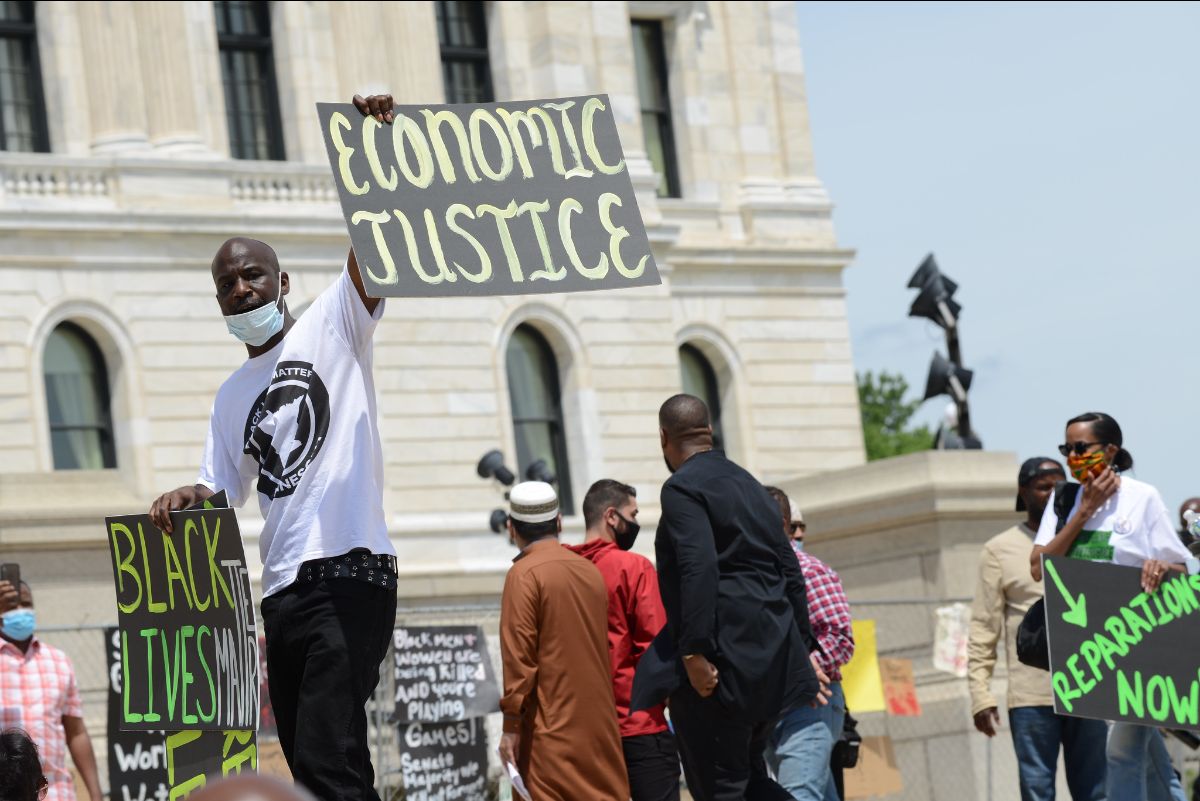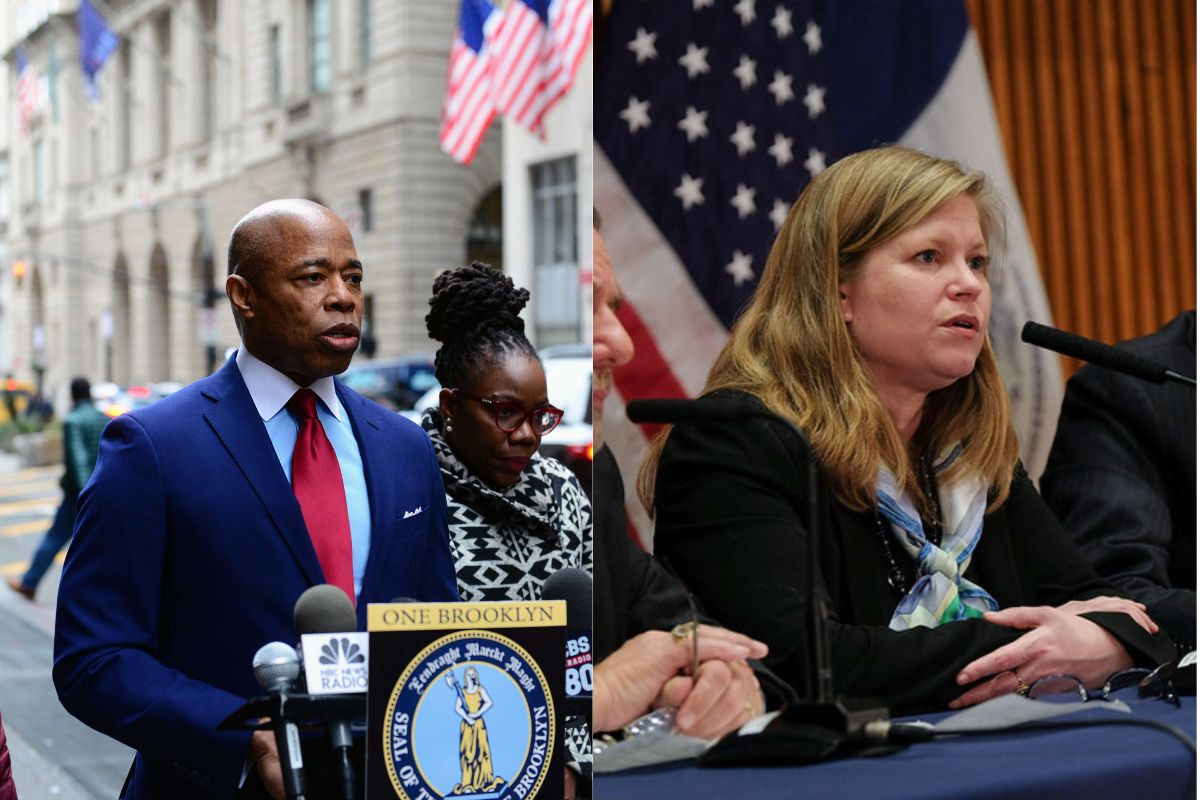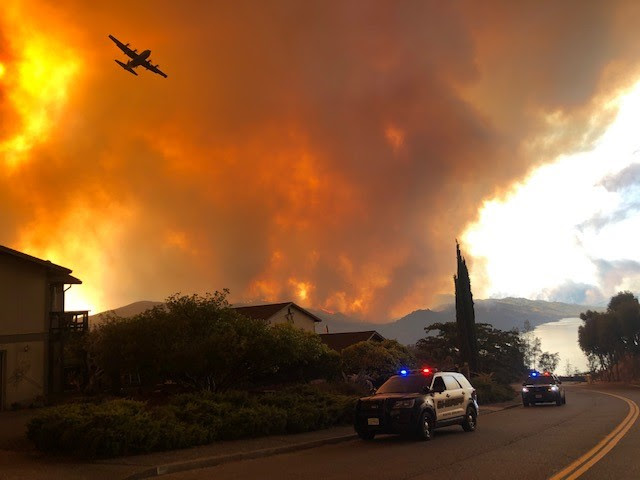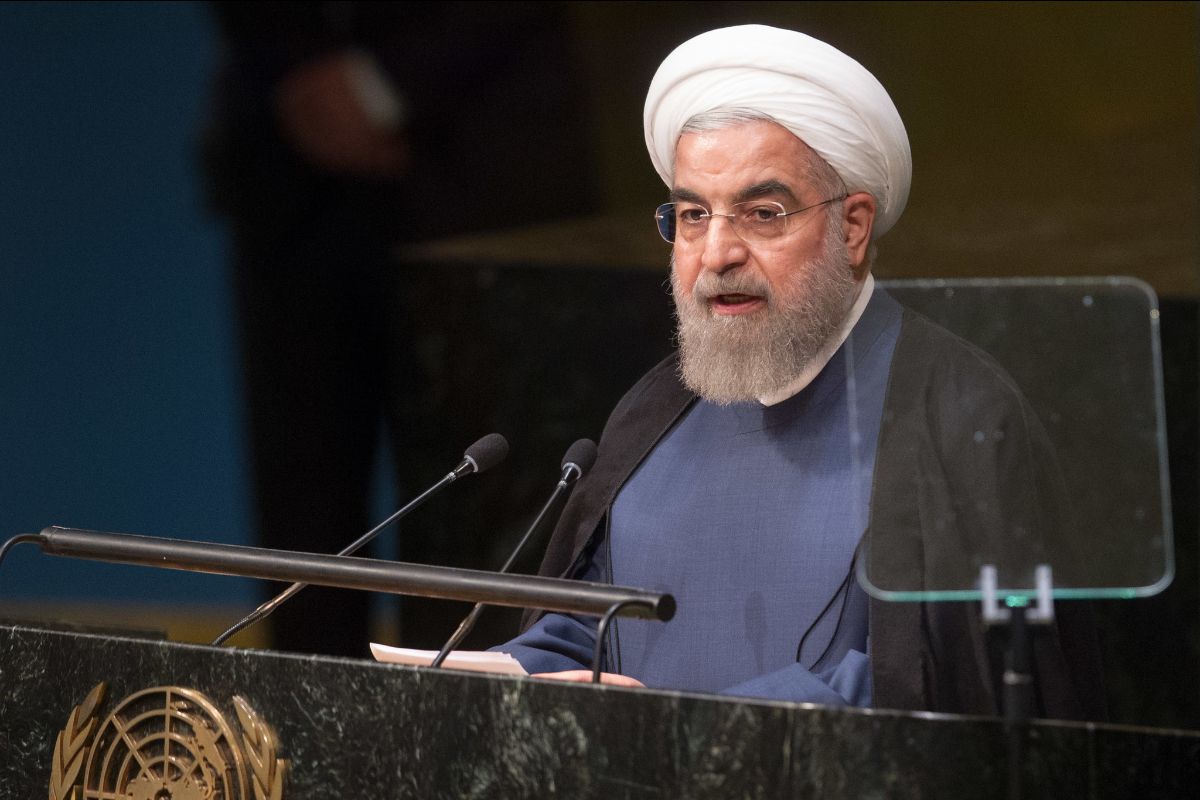Top photo: Iranian President Hassan Rouhani addresses the UN General Assembly in September 2020. (UN Photo / Loey Felipe)
Welcome to Factal Forecast, a look at the week’s biggest stories and what they mean from the editors at Factal. We publish our forward-looking note each Thursday to help you get a jump-start on the week ahead. If this email was forwarded to you, and you like what you see, you can subscribe for free.

A look ahead:
June 18/ Iranian presidential election: Iran will hold elections Friday to elect a successor to outgoing President Hassan Rouhani who has served in the position since 2013.
- What’s happened so far: Iranians will choose between seven candidates that passed the scrutiny of Iran’s powerful Council of Guardians, a constitutional body overseen by the Supreme Leader tasked with allowing specific candidates to run. Of the seven candidates enabled to run out of the 585 that applied, none are what would be considered a prominent “reformist.” The favorite to win is conservative judiciary chair Ebrahim Raisi, the second place finisher to Rouhani in 2017.
- The impact: The election comes as talks continue in Vienna between Iran and other participants in the historic 2015 nuclear deal to attempt to negotiate a return to compliance after former President Donald Trump’s decision to unilaterally leave the deal in 2018. The talks are unlikely to produce an agreement by Friday’s election, though are said to be making progress. Despite coming from the conservative camp, Raisi signaled his intention to continue the talks. However, turnout in the election, particularly among Iran’s disillusioned youth, is worth watching with the expected election of Raisi, a close ally of the Supreme Leader, sparking fears of intensified repression of domestic dissent.
June 18/ Verdict expected in Liberian war crime trial: The Swiss Federal Criminal Court is expected to announce a verdict in the trial of former Liberian rebel commander Alieu Kosiah on Friday. Kosiah is charged with war crimes related to the First Liberian Civil War and faces a maximum sentence of 20 years.
- What’s happened so far: Kosiah is accused of a wide range of atrocities including murder, rape, recruiting child soldiers and cannibalism during the time he served as a commander of the United Liberation Movement of Liberia for Democracy (ULIMO) during its fight against the National Patriotic Front of Liberia. He fled to Switzerland in 1999 before being arrested in 2014 under a law allowing Swiss courts to exercise what’s known as universal jurisdiction over war crimes.
- The impact: Kosiah may be the first Liberian national to be tried for war crimes related to the country’s civil wars, but he’s unlikely to be the last. Former ULIMO commander Kunti K., who was allegedly active in the same region as Kosiah during the first civil war, is expected to be tried in France for crimes against humanity. The outcome of Kosiah’s trial will likely indicate how future trials on Liberian war crimes are decided.

June 19/ Juneteenth celebrations: Juneteenth, an annual holiday celebrating the end of slavery in the United States, will be marked nationwide Saturday both with celebrations and demonstrations.
- What’s happened so far: Black Americans have celebrated Juneteenth since the 1800s. In recent years, propelled by the Black Lives Matter movement and the George Floyd police brutality protests, there’s been renewed attention on the holiday, and, this week, it is likely to become the first new federal holiday since 1983, when Martin Luther King Jr. Day was created. Congress passed legislation recognizing it Wednesday, following similar action on a smaller scale by companies such as Google, Nike and NFL.
- Impact: In the year since the George Floyd protests, pressure on American cities to enact widespread police reform has dwindled. While Los Angeles announced cuts to the police budget last July following nationwide protests, the city council recently approved a 3 percent increase in funding. Meanwhile, Congress is at a standstill on a bipartisan deal on national police reform. Activists will likely use Juneteenth to respond to this, with protests likely in hotspots such as Los Angeles, New York and Portland, Ore.
June 20/ Armenia parliamentary election: Armenians will head to the polls on Sunday for the country’s second snap parliamentary election in three years, following a campaign marred by allegations of violent language.
- What’s happened so far: Armenian incumbent Prime Minister Nikol Pashinyan fell out of favor following the nation’s defeat in last year’s conflict with Azerbaijan over the disputed territory of Nagorno-Karabakh. In November 2020, thousands of protesters marched through the streets of Yerevan, leading him to resign and snap elections to be called. Polling indicates Pashinyan’s Civil Contact party will narrowly retain the largest vote share, with the Armenia Alliance led by former President Robert Kocharyan close behind.
- The impact: The country’s ombudsman raised concerns over antagonistic rhetoric from both leading candidates in the run-up to the vote, due to fears it could lead to clashes between opposing supporters. The Organization for Security and Co-operation in Europe is sending an observation mission to oversee voting and ballot counting at polling stations. If Pashinyan does win another term, further protests may occur if he is not seen to be fulfilling his campaign promises.

June 20/ Tokyo to lift state of emergency: With coronavirus cases subsiding and the Olympics set to begin in just over a month, Japan is scheduled to end Sunday a state of emergency declared in Tokyo and nine other prefectures.
- What’s happened so far: In April, Japan declared a third state of emergency for Tokyo and three prefectures in response to the country’s fourth wave of coronavirus cases. The state of emergency has since been expanded to more prefectures, and extended until June 20. Vaccination rates remain relatively low with about 4 percent of the country’s population of 125 million fully vaccinated, though the pace has slowly picked up.
- The impact: While the state of emergency is set to end as scheduled, some prefectures will shift into quasi-states of emergency, with officials considering extending those measures through the Olympics. Okinawa, however, will remain in the state of emergency until July 11 because officials say the healthcare system is “overstretched. Olympic organizers are also expected to make a decision about whether even local fans will be allowed to attend the games. Despite continued pressure to cancel, officials are insistent the games will go ahead.
June 21/ U.S. border restrictions decision: The Biden administration is expected to announce by Monday whether it plans to extend coronavirus-related travel restrictions that are set to expire with Mexico and Canada, as improving conditions in all three countries boost the case for reopening.
- What’s happened so far: Borders have been closed to non-essential travel for more than a year, as the United States struggled to contain the spread of the virus, posting the world’s highest reported cases and deaths. A sharp reversal began to take hold in the United States in January as improving vaccine rollout helped increase inoculation rates and the government formed working groups to study the safe reopening of its borders with Mexico, Canada and Europe earlier this month.
- The impact: Pressure is mounting to ease restrictions as all three governments work to accelerate economic recovery, especially for industries that continue to suffer, such as tourism. With more than half of American adults vaccinated, the United States has been sending supplies to Mexico and Canada, where inoculation rates remain lower. The United States is holding separate meetings with Mexican and Canadian officials ahead of Monday’s deadline, though there’s no indication yet that easing action is imminent.
June 21/ Ontario man to face terror charges: The man accused of killing four members of a Muslim family in London, Ontario, is scheduled to appear in court Monday after prosecutors upgraded his charges to terrorism this week.
- What’s happened so far: Nathaniel Veltman allegedly ran over five members of a Canadian-Muslim family in London, Ontario, last Sunday, killing four and gravely injuring a 9-year-old boy. Canada’s attorney general has approved terror charges against the 20-year-old suspect, who also faces four counts of first-degree murder and one count of attempted murder. London police said the incident was a “planned, premeditated attack” targeting victims “because of their Islamic faith.”
- The impact: The attack has revived public discourse on Islamophobia in Canada, with the National Council of Canadian Muslims urging Prime Minister Justin Trudeau to “take concrete action” in addressing Islamophobia. Terror charges are relatively rare in Canada — a 2018 report found just 55 people in the country have been charged with terrorism-related offenses since it became a part of the criminal code in 2001. The story has captured international attention, with world leaders from the United States, Pakistan and Turkey condemning the attack.

June 22/ New York City mayoral primary: Democrats will choose their candidates Tuesday in the New York City mayoral race to lead the biggest city in the United States.
- What’s happened so far: With Mayor Bill de Blasio’s term expiring, more than a dozen Democrats have thrown their hat in the ring, including Brooklyn Borough President Eric Adams, former Sanitation Commissioner Kathryn Garcia, New York Comptroller Scott Stringer and one-time presidential candidate Andrew Yang. In April, a woman accused Stringer of sexual abuse and an allegation of sexual misconduct followed in June. He refused to withdraw from the race and recent polls show Adams and Garcia as front-runners with Yang and former de Blasio aide Maya Wiley trailing.
- The impact: This will be the first time the city uses ranked-choice voting. If no candidate has a majority of votes, the person with the lowest number of first-choice votes is eliminated. This is done until a winner is determined. The process is used to ensure the winner has broad support, however, it’s led to fewer polls making a surprise more likely. No major Republican candidate is running, meaning this race will likely determine who will win the general election in November. That person immediately becomes a name to remember for national politics, as the last three mayors of New York have all gone on to run for president.
June 23/ First Hong Kong National Security Law trial: The first person charged under Hong Kong’s draconian National Security Law will stand trial Wednesday facing terrorism and secession charges.
- What’s happened so far: Tong Ying-kit, the 24-year-old defendant, is accused of driving a motorcycle into three police officers during a protest on July 1, 2020. He is additionally accused of inciting others by chanting a popular protest slogan and faces charges over traffic violations. A central remaining question surrounding the trial is whether or not jurors will be present with an appellate court set to rule a day prior to the trial whether or not to allow jurors or leave the suspect’s fate in the hands of the three judges hand picked by Hong Kong Chief Executive Carrie Lam.
- The impact: The decision regarding whether or not jurors will be present cuts at the core of a central tenet of Hong Kong’s de-facto constitution which holds that High Court criminal cases must be heard before a judge and jury. If the appellate court upholds the decision that a jury trial is not a constitutional right, it would open the door for subsequent National Security Law cases to also proceed with only Lam’s hand picked judges presiding. As for the trial itself, the maximum penalty the suspect faces is life. If sought, it may provide a glimpse into just how far Hong Kong authorities are willing to go when applying the law.
June 24/ Gibraltar abortion referendum: Gibraltar, one of the countries in Europe with the strictest abortion laws, will hold a referendum Thursday on whether abortion should be partially legalized.
- What’s happened so far: Abortion is currently banned in Gibraltar under threat of life imprisonment. If passed, the law would allow abortion up to 12 weeks into pregnancy if the woman’s mental or physical health is deemed at risk or if there is substantial risk of fatal fetal abnormality. The referendum was due to take place last year but was delayed by 15 months due to the pandemic.
- The impact: There are only six European countries currently with a ban on abortion in place, with Andorra, Malta and San Marino not allowing abortion under any circumstances. Only last year, after years of campaigning by activists, a new framework for lawful abortion services came into effect in Northern Ireland. But other countries are going the opposite direction, with Poland earlier this year enforcing a near-total ban on abortion, sparking nationwide protests. However, a vote in Gibraltar next week to partially legalize abortions could lead other nations to follow suit.

What else matters:
Extreme drought in western United States: According to the U.S. Drought Monitor, nearly 38 percent of the United States was under moderate to exceptional drought conditions last week, including nearly all of California, Oregon, Utah and Nevada. As local officials call on residents to conserve water, Utah Gov. Spencer Cox went so far as to ask residents to join him in a weekend of prayer earlier this month for drought relief.
- Watch for: Just over 10 million acres across the United States were burned by wildfires in a record-breaking 2020, and officials are bracing for another difficult season. Through June 11, the National Interagency Fire Center put the total number of acres burned thus far in 2021 at approximately 830,000, up more than 25 percent from the same time a year ago. That figure includes the Telegraph Fire in Arizona, which had grown to more than 100,000 acres as of Tuesday and is already one of the largest wildfires in state history. Meanwhile, the record-low and dropping water level of Lake Mead — the reservoir created by the Hoover Dam — reveals its own set of drought impacts. In addition to reducing the dam’s electrical output, millions of people depend on the lake for its water supply. Despite better preparation than in years past, regulators say a heat wave similar to those experienced last summer in California could again strain the electric grid.
New Israeli government sworn in: Israel’s new government has taken office following a swearing-in ceremony this week at the country’s parliament, the Knesset, amid shouts of protest from Likud Party members. Newly-appointed Prime Minister Naftali Bennett, having just won a confidence vote by 60-59 votes, welcomed the diversity of his coalition and outlined his government’s priorities.
- Watch for: Bennett has had serious issues to deal with in his first week. An uneasy ceasefire was further tested as Israel launched airstrikes in Gaza in response to incendiary balloons released from the territory. The new prime minister will be under pressure to maintain this ceasefire, which has been backed by the United States and mediated by Egypt. Analysts also caution that both Palestinian and Israeli groups may seek to further test him in the early stages of his premiership. On top of all of this, Bennett has a laundry list of domestic and foreign issues to face including preserving the stability of his coalition government, a possible Iranian nuclear deal, which he has already labeled a mistake, maintaining Israel’s newly-established diplomatic relations with its Arab neighbors, and continued political opposition from former Prime Minister Benjamin Netanyahu, who is said to be plotting his comeback.
Extended outlook: What’s on our radar in the coming weeks
June 11: G7 Summit in Cornwall, England; UEFA Euro 2020 men’s soccer tournament
June 12: Algerian legislative elections; Trooping the Colour military ceremony in London
June 13: Confidence vote of Israel’s new government
June 14: NATO summit in Brussels; Aung San Suu Kyi trial in Myanmar
June 15: California to relax many coronavirus restrictions
June 16: Biden-Putin summit in Geneva, Switzerland
June 17: China’s Shenzhou 12 launch planned; Gbagbo returns to Ivory Coast; U.S. Open golf tournament begins
June 18: Iranian presidential election; verdict expected in war crime trial of Liberia’s Alieu Kosiah
June 20: Round 1 of French regional elections; Armenian parliamentary elections
June 21: Ethiopian elections
June 22: New York City mayoral primary
June 24: Gibraltar abortion referendum; Resorts World Las Vegas scheduled to open
June 25: Aruban general election; sentencing for Derek Chauvin
June 27: Round 2 of French regional elections
June 28: Wimbledon tennis tournament begins
July 11: Elections in Moldova
July 23: Tokyo Summer Games

